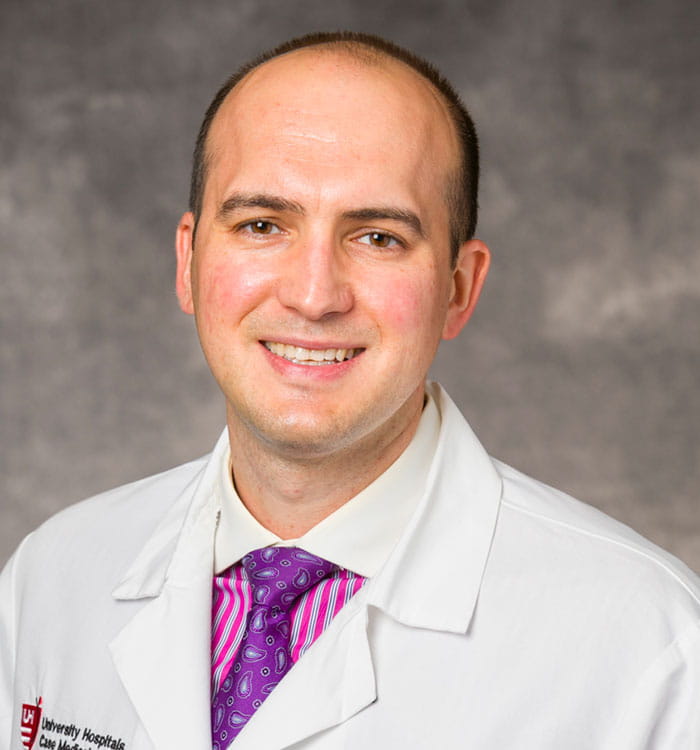UH Seidman Cancer Center Leads $7.3 Million Multi-Site Trial of Relapse Prevention in ALL
November 08, 2020
Survival at one year post-stem cell transplant is 100%
Innovations in Cancer | Fall 2020
Upwards of 50% of patients who undergo an allogeneic stem cell transplant for acute lymphocytic leukemia (ALL) will relapse in the first year after treatment. This sobering fact and recent changes in treatment protocols for other blood cancers have given UH Seidman Cancer Center hematologist/oncologist Leland Metheny, MD, an idea.
 Leland Metheny, MD
Leland Metheny, MD“It used to be that transplant, whether it be an autologous or allogeneic, was the definitive therapy,” he says. “Previously, there was no prophylaxis or maintenance therapy to prevent relapse. But that has changed recently in two disease states. One is multiple myeloma. Patients are transplanted, and then they're placed on maintenance chemotherapy and that prolongs survival. The other is Hodgkin's lymphoma. Patients are transplanted and then they get a maintenance therapy called brentuximab up to 16 months after their transplant. And both of those maintenance therapies have shown to prolong progression-free survival and overall survival.”
Building on this intellectual framework, Dr. Metheny is leading a multi-site Phase I/II clinical trial, investigating a possible mode of relapse prevention for a different population of patients -- those with ALL. Specifically, he’s looking at whether low-dose inotuzumab ozogamicin for post-transplant maintenance can prevent ALL relapse. As principal investigator, he has secured a $7.3 million grant from Pfizer to expand the trial beyond the original sites of UH Seidman Cancer Center and Cleveland Clinic. Already, colleagues at Memorial Sloan Kettering Cancer Center have signed on, and expansion to more sites across the U.S. is planned in the coming months.
“It started out as a multi-site clinical trial with two institutions,” Dr. Metheny says, who is also an Assistant Professor of Medicine at Case Western Reserve University School of Medicine. “Working with Pfizer because of what we saw in regards to the outcomes, we decided to expand the clinical trial to incorporate larger number of ALL patients in a Phase II portion. We’re also expanding the disease states from ALL to patients with non-Hodgkin's lymphoma, as they tend to also have CD 22-positive cells, which inotuzumab targets. So that is where it's going now. We are starting the process of working with a number of sites, from the Eastern seaboard to the Western seaboard.
All ALL patients in the Phase I trial are receiving a low dose of inotuzumab once their blood counts show they have recovered from some, if not all, of the toxicities of the transplant. Doses are repeated every 28 days.
“The current status of our protocol is we give a total of four doses over four months, roughly,” Dr. Metheny says. However, he adds that he has submitted an amendment to the protocol with the U.S. Food and Drug Administration, which would expand the number of cycles up to 12.
“Potentially, a patient could be on maintenance therapy for a year after transplant,” he says.
Results so far have been very encouraging, Dr. Metheny says.
“We've enrolled now 13 patients, and all of the patients are alive,” he says. “And at one year post-transplant, we've only had one relapse, which is good. Obviously we still need more patients to prove this agent’s effectiveness as a maintenance therapy, but it appears to be safe in this population. We have not found particularly problematic toxicities related to low doses of this agent.”
This is good news for patients who often don’t have many good options.
“The fact that so few people have relapsed obviously has been a welcome surprise,” Dr. Metheny says. “If you take the ALL patients who go through transplant, you'll just on average have 20% mortality within the first year. So the fact that they're all alive at one year is evidence obviously that the drug, given at the doses that we have chosen, is very safe.”
Dr. Metheny says he expects to hear soon on the FDA amendment expanding dosing to 12 doses and expanding the study population to patients with non-Hodgkin lymphoma. Work is continuing at new study sites, including Dana Farber Cancer Institute and Fred Hutchinson Cancer Center. The goal is to ultimately launch a Phase III randomized clinical trial.
“We hope to get this clinical trial to accrue fully and be completed in the next two to three years, which is fairly aggressive,” he says. “But we hope to just robustly accrue and then depending on the results, advance a Phase III randomized study.”
If you have a patient who you believe could benefit from this clinical trial, please email Leland.Metheny@UHhospitals.org.


